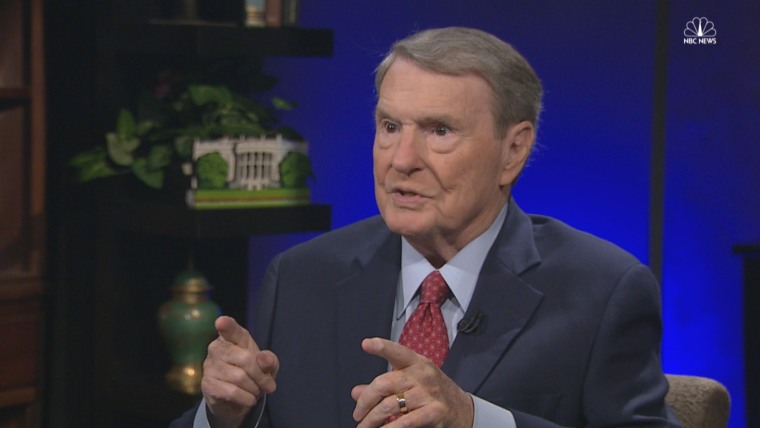The pending presidential debates between Hillary Clinton and Donald Trump are all about the voter, according to 12-time debate moderator Jim Lehrer who presided over his first debate in 1988 and continued through the 2012 cycle.
“There’s only one test and that is that this debate reveals who these two people are in a way that the public can make a decision on their own as to whom to vote for or to vote against,” Lehrer said of a successful debate.
He explained that no matter who a person votes for, one of the people on the debate stage will end up behind the desk in the Oval Office and it’s important for voters to take this opportunity for serious comparison.
“I would tell them, if possible, to remove their partisan prism when they watch,” he said.
And in an election where both candidates suffer from low favorability ratings -- 52 percent negative for Clinton and 61 percent negative for Trump in the latest NBC News/Wall Street Journal poll -- Lehrer said a vote doesn’t necessarily have to reflect support.
“There’s nothing in the Constitution that says you can only vote positively,” he said. “If you feel somebody would be a terrible President of the United States, it’s okay to vote against them.”
For the moderators presiding over this year’s debates, Lehrer’s advice was a simple mantra: “This is not about me.”
“He or she is an instrument of the democratic process,” he said of the moderators. “He or she is not there as some kind of third star on the stage.”
Debates are more difficult to moderate today than in the days when Lehrer began, because candidates are now encouraged to interact with each other and the debate structure is more loose.
“In those early days you were really kind of a timekeeper and you did write the questions and you asked the questions and people only had two minutes and it was all very controlled.”
The modern format of the debates puts more pressure on moderators to listen to the interactions and pivot the conversation between the two candidates than it does asking specific questions.
“It’s not about the questions,” he said. “It’s about being comfortable enough to listen to the answers and then react.”
But that doesn’t mean fact checking, according to Lehrer. That responsibility falls to the candidates themselves to do in real time and the obligatory post-game analysis of journalists vetting what the candidates said on stage.
These debate could draw nearly Super Bowl sized viewership at a time when some 62 percent of the country feels the nation is headed in the wrong direction, according to the latest NBC News/Wall Street Journal Poll.
“It could intensify the divisions-- it could intensify the hostility-- or it could mitigate it,” Lehrer said of the debates. “Because now everybody’s looking, everybody’s listening, everybody has an opportunity to follow this.”
When Clinton and Trump take the stage for the first time Monday night it will be the first time the candidates will be on the same stage at the same time engaging one another. Lehrer said perhaps most revealing from the event will be how the candidates present themselves on stage.
“You can learn an awful lot about a person with their body language,” he said. “In fact, I would argue that in some of these debates, the body language has spoken louder than the words.”
With that in mind, this long-time moderator has very simple advice for the candidates:
“The number one advice I always give to anybody who’s gonna debate is just try your best to be yourself, because it’s really hard to fake.”
But for his own feelings this cycle, Lehrer is content not being behind the moderator’s desk for a thirteenth time.
“I have flashes of missing it, but only for about 30 or 40 seconds at a time.”

